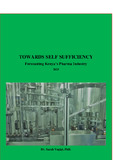| dc.description.abstract | This book provides a critical and timely analysis of Kenya’s pharmaceutical manufacturing sector. Like
many countries across the African continent, Kenya continues to depend heavily on imported
pharmaceutical products to meet its domestic health needs. This dependence poses a long-standing
challenge to national health security despite years of policy efforts to boost local production.
This book, originally developed as a graduate thesis, presents a comprehensive study of Kenya’s
pharmaceutical manufacturing capacity as the foundation for forecasting self-sufficiency. The findings,
though collected ten years ago, remain remarkably relevant today. A 2020 study conducted by the
International Development Research Centre (IDRC) on improving access to essential medicines in
Kenya concluded that the country lacks adequate technical, financial, and human capacity to ensure
sufficient domestic pharmaceutical production. The study further revealed that local pharmaceutical
manufacturers supplied only 28% of the nationally required essential medicines. Moreover, a 2024
Ministry of Health report on local manufacturing capacity confirms that many of the constraints
identified in this study persist. Key issues include inadequate manufacturing technology and
infrastructure, workforce shortages, constrained access to raw materials, and the underutilization of
existing production capacity.
The core objective of this study was to assess Kenya’s capacity to produce essential medicines locally
and to estimate when it could achieve pharmaceutical self-sufficiency. Drawing from data including
on-site assessments of manufacturing plants capacity, workforce capacity, utility systems, and
regulatory compliance, the book provides a grounded and comprehensive deep-dive into the Kenya
pharmaceutical manufacturing sector.
What makes this study particularly valuable is its practical, ground-level approach. The author,
currently in academia, brings over 20 years of experience in pharmaceutical manufacturing and quality
systems, combined with a public policy perspective, lending credibility and depth to the situational
analysis. By computing available and utilized production capacity across the manufacturing facilities
and comparing locally produced products with the WHO Essential Medicines List, the book establishes
a clear baseline for evaluating self-sufficiency potential.
Importantly, this study is not only technical but policy-relevant. This book provides a solid evidence
base for decision-making and contributes directly to ongoing national conversations about health
industrialization, particularly under Kenya’s Vision 2030, where pharmaceutical manufacturing has
been identified as a priority sector. As the government intensifies efforts to increase local production to
cover over 50% of essential medicines demand, this book offers both a diagnostic framework and a
roadmap to potential solutions.
Despite the time elapsed since the data was first gathered, the insights remain timely and urgent. The
challenges and opportunities outlined here are critical for policy makers, industry stakeholders, and
development partners working to revitalize Kenya’s pharmaceutical sector. In publishing this book now,
the author brings a well-researched, practically grounded, and still-relevant contribution to one of
Kenya’s most strategic development goals: pharmaceutical self-sufficiency.
As I reflect on my experience as a pharmaceutical consultant and former expert in local pharmaceutical
production with the United Nations Industrial Development Organization (UNIDO), I contend that
Kenya’s pharmaceutical industry is underpinned by robust policy and strategic frameworks that are
closely aligned with the country’s national health and industrial development goals. However, this book
recommends that realizing the industry’s full potential requires coordinated efforts among policymakers, industry stakeholders, academic institutions, research bodies, and regulatory authorities to
assess the current landscape, identify existing gaps, and develop viable solutions that ensure adherence
to quality standards and regulatory compliance. Such integration is critical to building sustainable
production capacity, assuring the quality of medicines, and meeting both national healthcare needs and
regional export demands. | en_US |

